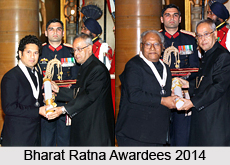 Bharat Ratna Award is the highest civilian award presented to an Indian citizen by the Government of India. The award is mainly presented for honouring the extraordinarily talented Indians for their outstanding contribution to their respective fields. The award is also given for the highest degrees of national service and achievements in the artistic, literary and scientific fields. Though the recipients of Bharat Ratna Award do not receive any special title, like the Knights in England, they do occupy a special place among all the civilians in India. The Bharat Ratna Awardees receive a medal in the shape of Peepul Leaf, where the term Bharat Ratna is written in Hindi, and also a memorandum from the President of India.
Bharat Ratna Award is the highest civilian award presented to an Indian citizen by the Government of India. The award is mainly presented for honouring the extraordinarily talented Indians for their outstanding contribution to their respective fields. The award is also given for the highest degrees of national service and achievements in the artistic, literary and scientific fields. Though the recipients of Bharat Ratna Award do not receive any special title, like the Knights in England, they do occupy a special place among all the civilians in India. The Bharat Ratna Awardees receive a medal in the shape of Peepul Leaf, where the term Bharat Ratna is written in Hindi, and also a memorandum from the President of India.
The detailed list of Bharat Ratna Awardees is given below:
| Year | Awardee | Notes | Indian State or Country or Region |
| 1954 | Sir Sarvepalli Radhakrishnan | Second President, First Vice President, Philosopher. | Tamil Nadu |
| Chakravarti Rajagopalachari | Last Governor-General, Freedom Fighter. | Tamil Nadu | |
| Sir C. V. Raman | Nobel-prize winning Physicist | Tamil Nadu | |
| 1955 | Bhagwan Das | Literature, Freedom Fighter | Uttar Pradesh |
| Sir Mokshagundam Visvesvarayya | Civil Engineer, Dam Architect, Diwan of Princely state of Mysore | Karnataka | |
| Jawaharlal Nehru | First Prime Minister, Freedom Fighter, Author | Uttar Pradesh | |
| 1957 | Govind Ballabh Pant | Freedom Fighter, Jurist Home Minister | Uttar Pradesh (now Uttarakhand) |
| 1958 | Dhondo Keshav Karve | Educationist, Social Reformer | Maharashtra |
| 1961 | Dr. B. C. Roy | Physician, Politician, Former Chief Minister of West Bengal | West Bengal |
| Purushottam Das Tandon | Freedom Fighter, Educationist | Uttar Pradesh | |
| 1962 | Dr. Rajendra Prasad | First President, Freedom Fighter, Jurist | Bihar |
| 1963 | Dr. Zakir Hussain | Former President, Scholar | Andhra Pradesh |
| Pandurang Vaman Kane | Indologist, Sanskrit scholar | Maharashtra | |
| 1966 | Lal Bahadur Shastri | Posthumous, Second Prime Minister, Freedom Fighter | Uttar Pradesh |
| 1971 | Indira Gandhi | Former Prime Minister | Uttar Pradesh |
| 1975 | V. V. Giri | Former President, Trade Unionist | Orissa |
| 1976 | K. Kamaraj | Posthumous, Freedom Fighter, Chief Minister-Tamil Nadu | Tamil Nadu |
| 1980 | Mother Teresa | Nobel Laureate (Peace, 1979) | Republic of Macedonia (Naturalised Indian) |
| 1983 | Acharya Vinoba Bhave | Posthumous, Social Reformer, Freedom Fighter | Maharashtra |
| 1987 | Khan Abdul Ghaffar Khan | First non-citizen, Freedom Fighter | Pakistan |
| 1988 | M. G. Ramachandran | Posthumous, Chief Minister-Tamil Nadu, Actor | Tamil Nadu |
| 1990 | B. R. Ambedkar | Posthumous, Architect of Indian Constitution, Social Reformer, Economist, Scholar | Maharashtra |
| Nelson Mandela | Second non-citizen and first non-Indian, Leader of Anti-Apartheid Movement | South Africa | |
| 1991 | Rajiv Gandhi | Posthumous, Former Prime Minister | New Delhi |
| Sardar Vallabhbhai Patel | Posthumous, Freedom Fighter, First Home Minister of India | Gujarat | |
| Morarji Desai | Former Prime Minister, Freedom Fighter | Gujarat | |
| 1992 | Maulana Abul Kalam Azad | Posthumous, Freedom Fighter, First Education Minister of India | West Bengal |
| J. R. D. Tata | Industrialist, Philanthropist | Maharashtra | |
| Satyajit Ray | Film Director, Oscar Winner | West Bengal | |
| 1997 | APJ Abdul Kalam | Former President, Scientist | Tamil Nadu |
| Gulzarilal Nanda | Freedom Fighter, Former Prime Minister | Punjab | |
| Aruna Asaf Ali | Posthumous, Freedom Fighter | West Bengal | |
| 1998 | M. S. Subbulakshmi | Carnatic music vocalist | Tamil Nadu |
| Chidambaram Subramaniam | Freedom Fighter, Minister of Agriculture (Father of Green revolution) | Tamil Nadu | |
| Jayaprakash Narayan | Posthumous, Freedom Fighter, Social Reformer | Bihar | |
| 1999 | Pandit Ravi Shankar | Classical Sitar player | Uttar Pradesh |
| Amartya Sen | Nobel Laureate (Economics, 1998) | West Bengal | |
| Gopinath Bordoloi | Posthumous, Freedom Fighter | Assam | |
| 2001 | Lata Mangeshkar | Play Back Singer | Maharashtra |
| Ustad Bismillah Khan | Classical Shehnai Maestro | Bihar | |
| 2008 | Pandit Bhimsen Joshi | Hindustani Classical Vocalist | Karnataka |




















